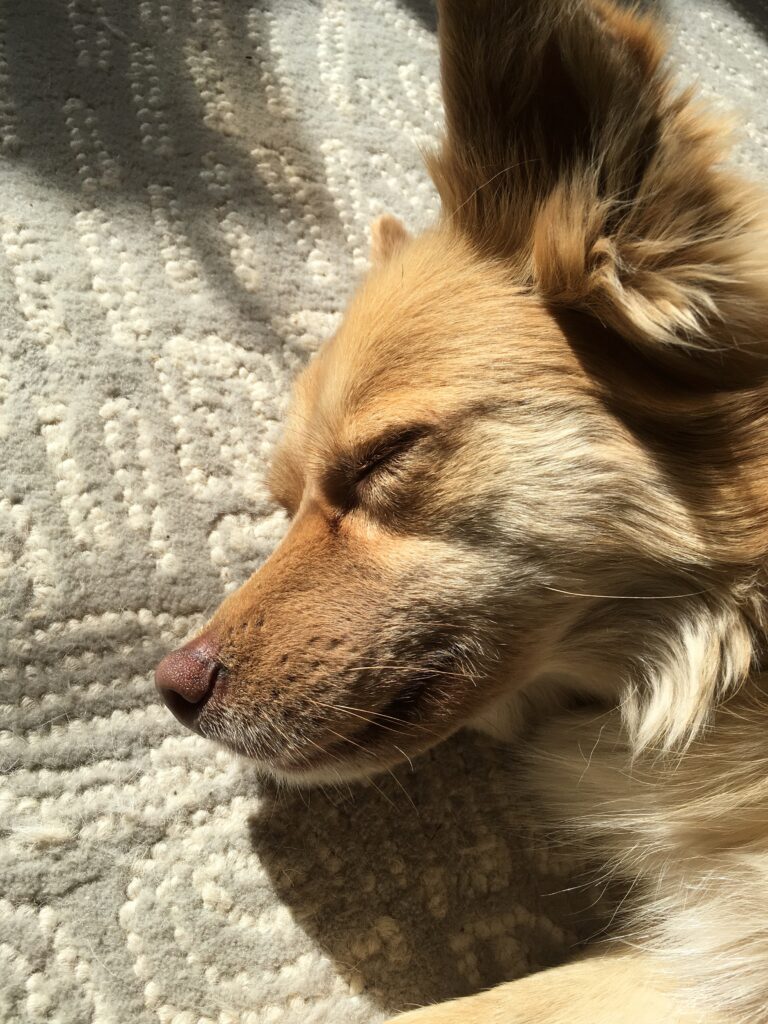In April 2020, we adopted our ‘Covid dog’, a rescue who needed a lot of TLC. There’s no better illustration of how love heals trauma than this little guy. He’s slowly becoming affectionate and playful, at least some of the time. He also spends a lot of his time lying under the table but that’s probably sensible in an earthquake zone like Portland.

Since he’s entered my life, something else has also happened: I started to listen to a ton of audiobooks. Long walks are perfect for this. I find audiobooks to be sort-of in the middle of reading and having a discussion, but one thing is annoying. When an audiobook provokes a thought I’d like to return to, it’s probably destined to go uncaptured.
I took Building A Second Brain for the first time a while ago now, and though I’ve refreshed my understanding several times in later cohorts, I have not adopted a systematic note-taking practice. In a way, this daily writing is as close as I get, and it’s definitely skipping some steps of the CODE (Capture, Organize, Distill, Express) process that the course centres around. Is this “bad?” Not exactly- I think the key takeaway of BASB for me is “focus on shipping” – or something maybe less bro engineer speak, like “move projects ahead and don’t get too caught up in the planning.”
By failing to prepare, you are preparing to fail.
-Benjamin Franklin
I love me some planning. It is valuable to plan, if only because it can help to focus, prioritize, and catch some blind spots. That said, thinking doesn’t manifest the world I want to be in. That requires action, process, practice. For a lot of things, the preparation is life. So my current PARA system (Projects, Areas, Resources, Archives— oh, the acronyms!) is basically all P – a few key things I want to make sure I’m moving forward on – plus random tasks that I guess would be categorized in Areas.
That said, it would be so much more awesome if there were a way for audiobook listening to be more capturable, so here’s my proposal:
- Audiobooks should have universal protocols for bookmarking. No matter where I listened to an audiobook, I should be able to take my timestamps and apply them elsewhere.
- Audiobook bookmarks should sync with all eBook bookmarks. When I bookmark in the audio, I should be able to open an Ebook and find the spot easily so I can grab the text in a note.
- The device I listen to the audiobook on should allow me to use voice controls to pause and take notes. As someone living in a place where cold and rainy is pretty common, I can’t keep a little notebook or even use a notes app without pain or at least basic dysfunction – have you ever tried typing with a wet screen? This seems like it’s the furthest out, but why? One reason, when a phone is playing audio, it isn’t listening too. If a watch could solve this problem, I would fork out for it in a heartbeat, but I was disappointed when I got an Apple watch and realized it wouldn’t work with Libby nor capture audio separately from my phone.
- Stop the terrible BS of walled gardens around eBooks. I get it, everyone believes DRM can keep people from “abusing copyright” but it’s nuts to me that I have books on my Kindle that I can’t read with reMarkable, audiobooks in Libby that can’t talk to eBooks from the same library, Scrib’d which rocks for all the content but doesn’t work on a Kindle, I mean everything about this is dumb. Perhaps THIS is a good use of the blockchain, to allow copyright holders to license content in the various ways they can today but let those systems communicate because they are tied to a user. (I’m inclided to say this will never happen because capitalism. But in a post-extractive world, I dunno, maybe?)
Imagine you write a book, and you release it in the various ways one does now:
- Paper book
- E-book for purchase
- E-book as a license (like on Amazon)
- E-book licensed to a distributor (a public library, a subscription service)
- E-book licensed to an organization (corporate, educational)
- Audiobook for purchase (note: does this even exist?)
- Audiobook for individual license (Amazon, Apple)
- Audiobook licensed to a B2C distributor (library or subscription service)
- E-book licensed to an organization (corporate, educational)
What if these licenses were on some kind of chain, so whenever an individual accessed the title, they could associate it with another format if they have access to it. This is convoluted, not for technical reasons but because copyright and licensing is a mess. Wouldn’t there be utility, though, for the copyright holder (ideally the author) to have a way to see how the book was being read, maybe even to be able to have some way to reach these people?
I do wonder sometimes if it’s a good thing to imagine business solutions to problems that only exist because of other businesses, I mean, it’s easy for this to all end up creating more bureaucracy rather than creating a clearer path. But if we had a solution like this, would we even need copyright? (If we’re pretending that copyright serves its stated purpose rather than being a tool of power and violence). Can copyright survive Dall-E and ChatGPT anyway?
I like thinking of even more interesting possibilities too, like what if as I’m listening to an audiobook, I could be connected with other people who have recently read the same thing and have a little 10 minute book club? It’s interesting to me that we don’t have a better book-based social media, since people who read books potentially are also more able to have prosocial conversations.
How are you doing your audiobook note-taking? I’d love to know.
